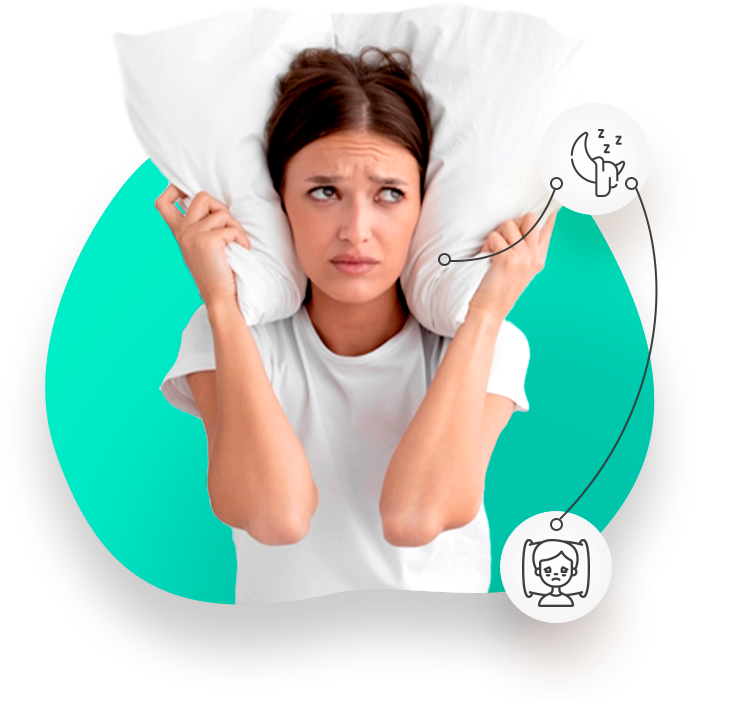Holiday Hours
Open Sun, May 26th, 9am-3pm and Closed Mon, May 27th, Memorial Day
Open Sun, May 26th, 9am-3pm and Closed Mon, May 27th, Memorial Day
Holiday Hours

On average, most adults need seven to eight hours a night for a good quality of life. However, the quantity and quality of sleep varies from person to person. Lack of enough or disrupted sleep can lead to sleep disorders impacting ones mental and physical health. Insomnia is a sleep disorder caused by difficulties in either falling and staying asleep or not getting enough sleep. It causes dissatisfaction with sleep quality and daytime tiredness. This can eventually lead to poor quality of life, and changes in mood, health, and impairment in a person’s social, academic, and work performance. Stress, traumatic events, medical conditions, or medications can lead you to experience short-term (acute) insomnia, lasting days, or weeks. Or long-term (chronic) insomnia that occurs three times weekly for three months or longer.
Causes of Sleep Problems:
Anxiety, worry, or stress can keep your mind active when you fall asleep, and keep it active, causing you poor sleep, or early awakenings.
Hectic work or travel schedules can disrupt your body’s internal clock (circadian rhythm) that regulates the sleep-wake cycle and metabolism among many things leading to insomnia. Some of the causes of this include traveling frequently for work or working various shifts at work.
Disrupted sleep patterns can contribute to insomnia. These can include going to bed at irregular hours, napping, a troublesome sleep environment, excessive noise, eating too much before sleeping, watching TV, and use of smartphones before bedtime. All these can affect your sleep cycle.
Various medical conditions can result in insomnia. For example, one may have sleep apnea, narcolepsy, and restless legs syndrome which can all prevent you from getting a good night’s sleep. Other examples of medical conditions associated with insomnia include chronic pain, cancer, diabetes, heart disease, asthma, gastroesophageal reflux disease (GERD), and many mental health disorders.
Several common drugs can interrupt normal sleep patterns causing insomnia. These are asthma drugs for heart, blood pressure, and drugs, as well as over-the-counter medicines for colds, allergies, and pain that contain stimulants preventing you from sleeping. Other drugs, such as certain antidepressants, ADHD medications, corticosteroids, and Parkinson's disease-related medications can also affect your sleep.
Drugs, stimulants, and alcohol can all keep you from getting proper sleep. Drinking caffeinated drinks such as coffee, tea and soda can prevent you from falling asleep for they are all stimulants. May seem like it helps one in sleeping, however, it prevents deeper stages of sleep which are important for one’s body to reset for a fresher start the next day.
On average, most adults need seven to eight hours a night for a good quality of life. However, the quantity and quality of sleep varies from person to person. Lack of enough or disrupted sleep can lead to sleep disorders impacting ones mental and physical health. Insomnia is a sleep disorder caused by difficulties in either falling and staying asleep or not getting enough sleep. It causes dissatisfaction with sleep quality and daytime tiredness. This can eventually lead to poor quality of life, changes in mood, health, and impairment in a person’s social, academic, and work performance. Stress, traumatic events, medical conditions, or medications can lead you to experience short-term (acute) insomnia, lasting days, or weeks. Chronic insomnia occurs three times weekly for three months or longer.
Anxiety, worry, or stress can keep your mind active when you fall asleep, causing you poor sleep, or early awakenings.
Hectic work or travel schedules can disrupt your body’s internal clock (circadian rhythm) that regulates the sleep-wake cycle and metabolism among many things leading to insomnia. Some of the causes of this include traveling frequently for work or working various shifts at work.
Disrupted sleep patterns can contribute to insomnia. These can include going to bed at irregular hours, napping, a troublesome sleep environment, excessive noise, eating too much before sleeping, watching TV, and use of smartphones before bedtime. All these can affect your sleep cycle.
Various medical conditions can result in insomnia. For example, one may have sleep apnea, narcolepsy, and restless legs syndrome which can all prevent you from getting a good night’s sleep. Other examples of medical conditions associated with insomnia include chronic pain, cancer, diabetes, heart disease, asthma, gastroesophageal reflux disease (GERD), and many mental health disorders.
Several common drugs can interrupt normal sleep patterns causing insomnia. These are asthma drugs for heart, blood pressure, and drugs, as well as over-the-counter medicines for colds, allergies, and pain that contain stimulants preventing you from sleeping. Other drugs, such as certain antidepressants, ADHD medications, corticosteroids, and Parkinson's disease-related medications can also affect your sleep.
Drugs, stimulants, and alcohol can all keep you from getting proper sleep. Drinking caffeinated drinks such as coffee, tea and soda can prevent you from falling asleep as they are all stimulants. These prevent deeper stages of sleep which are important for one’s body to reset for a fresher start the next day.
It is possible to overcome Sleep Problems and feel like yourself again.
We can help you improve your condition through multiple treatment options such as:


We are a primary care group that cares for individuals with anxiety, depression, bipolar disorder, ADHD, B.E.D., and other diagnoses. We primarily work with our patients to identify and diagnose the condition followed by the appropriate medication management. We believe in a holistic approach – combining lifestyle, exercise, mindfulness, psychotherapy and when needed, medications. Every person is unique and the key is in personalizing the right medication and the right dose. We use gene-drug information to guide the correct medication choice for the individual, instead of trying different medications to find the right one.
We approach every patient with respect. It is your mind and your body and YOU know it best. We do not believe in telling people what to do. Instead, we will work with you and provide scientific evidence and logic for the proposed plan of care. We want you to be very involved in your care as only YOU can tell us what you are feeling.
We will work with you on medication management as indicated, while you regain your balance. We believe in treating symptoms to remission, so people can be their true selves. We are open to patients of all identities, orientations, and beliefs – we urge you to bring your differences. Your strict privacy is very important to us.
Complete your health profile by answering questions about your medical history and current symptoms. We look at this much more than any other doctor or primary care in Chicago.
How hundreds of years of genetics influences your health
Your health biography - from birth to how you feel today
Up to 90% of your health is determined by your lifeslyle choices
Improving health starts with making the changes we believe in

We believe in a holistic approach to mental health that combines lifestyle, exercise, mindfulness, therapy when needed and medications.
We believe in a holistic approach to mental health that combines lifestyle, exercise, mindfulness, therapy when needed and medications.
It is your body and we respect that. What you put into your body should be your decision.
We want you to be very involved in your care as only YOU can tell us how and what you are feeling.
We do not believe in telling people what to do. Instead, we would like to work with you and provide scientific evidence and logic for the proposed plan of care.
Every person is unique and the key is in personalizing the right medication and the right dose. We use gene-drug information to guide the correct medication choice for the individual.
FAQs
1. Click on the Book Appointment
2. Pick the clinic or telemedicine
3. In our secure system, choose the service you want
4. Pick the date and time
5. Enter your information
6. The secure, encrypted system will prompt you to take a picture of your ID and insurance card and send it
7. We will verify your insurance and confirm your appointment
Sure, come on in! Also, to avoid a short wait, you can make a same-day appointment.
Please call and let us know! If you lose your appointment slot, there may be a short wait. We will try to address your most pressing problem today.
We work with a wide variety of insurance plans. Please verify we are in-network for you on our insurance page
You can access results in your “patient portal.” If there is anything concerning, we will set up an appointment to review with you.

Lakeview Immediate Care
1645 W School St, Chicago, IL 60657
Wicker Park Immediate Care
1601 W Division St, Chicago, IL 60622
This website uses cookies to ensure you get the best experience. See our